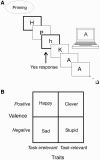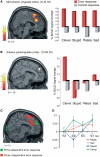Priming for self-esteem influences the monitoring of one's own performance
- PMID: 20551143
- PMCID: PMC3150849
- DOI: 10.1093/scan/nsq048
Priming for self-esteem influences the monitoring of one's own performance
Abstract
Social cues have subtle effects on a person, often without them being aware. One explanation for this influence involves implicit priming of trait associations. To study this effect, we activated implicit associations in participants of 'being Clever' or 'being Stupid' that were task relevant, and studied its behavioural impact on an independent cognitive task (the n-back task). Activating a representation of 'Clever' caused participants to slow their reaction times after errors on the working memory task, while the reverse pattern was seen for associations to 'Stupid'. Critically, these behavioural effects were absent in control conditions. Using functional magnetic resonance imaging, we show that the neural basis of this effect involves the anterior paracingulate cortex (area 32) where activity tracked the observed behavioural pattern, increasing its activity during error monitoring in the 'Clever' condition and decreasing in the 'Stupid' condition. The data provide a quantitative demonstration of how implicit cues, which specifically target a person's self-concept, influences the way we react to our own behaviour and point to the anterior paracingulate cortex as a critical cortical locus for mediating these self-concept related behavioural regulations.
Figures




References
-
- Amodio DM, Frith CD. Meeting of minds: the medial frontal cortex and social cognition. Nature Reviews Neuroscience. 2006;7:268–77. - PubMed
-
- Baddeley AD. Working memory. Oxford, England: Clarendon Press; 1986.
-
- Barch DM, Braver TS, Nystrom L, Noll DC, Cohen JD. Activation of prefronal cortex by the representation and maintenance of context information. Schizophrenia Research. 1997;24:163–66.
-
- Bargh JA, Chartrand TL. The mind in the middle: A practical guide to priming and automaticity research. In: Reis HT, Judd CM, editors. Handbook of Research Methods in Social and Personality Psychology. Cambridge: Cambridge University Press; 2000. p. 253.
-
- Bargh JA, Chen M, Burrows L. Automaticity of social behavior: Direct effects of trait construct and stereotype activation on action. Journal Of Personality And Social Psychology. 1996;71:230–44. - PubMed

